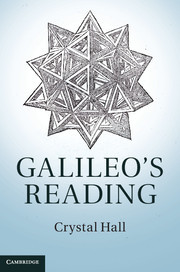Description
Galileo's Reading
Author: Hall Crystal
This book argues the importance of Galileo's reading and engagement with a range of writers to the shaping of early modern philosophy.
Language: English
Galileo's Reading
Publication date: 12-2013
Support: Print on demand
Publication date: 12-2013
Support: Print on demand
Galileo's Reading
Publication date: 09-2016
Support: Print on demand
Publication date: 09-2016
Support: Print on demand
Description
/li>Contents
/li>Biography
/li>
Galileo (1564?1642) incorporated throughout his work the language of battle, the rhetoric of the epic, and the structure of romance as a means to elicit emotional responses from his readers against his opponents. By turning to the literary as a field for creating knowledge, Galileo delineated a textual space for establishing and validating the identity of the new, idealized philosopher. Galileo's Reading places Galileo in the complete intellectual and academic world in which he operated, bringing together, for example, debates over the nature of floating bodies and Ludovico Ariosto's Orlando furioso, disputes on comets and the literary criticism of Don Quixote, mathematical demonstrations of material strength and Dante's voyage through the afterlife, and the parallels of his feisty note-taking practices with popular comedy of the period.
Introduction; 1. The poetry of early modern philosophy; 2. Starry knights; 3. Sarsi and the Saracens; 4. Galileo's lesson on Don Chisciotte (1622–5); 5. Shipwrecked, clueless, and quixotic; Bibliography.
Crystal Hall is currently Assistant Professor of French and Italian at the University of Kansas.
© 2024 LAVOISIER S.A.S.


